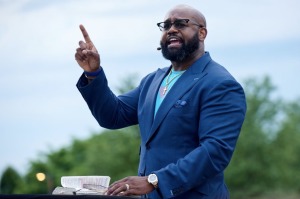What Obama and Romney Need to Do to Win Debate Number Two
After the first presidential debate there was little disagreement among Democrats or Republicans that Mitt Romney scored a decisive win, as President Obama looked distracted and unwilling to engage his opponent. Now supporters and pundits on both sides of the aisle are weighing in on what each candidate must do to perform well in Tuesday night's second debate at New York's Hofstra University.
Obama Must be Aggressive, But Not Too Aggressive
During the first debate President Obama's lack of aggression surprised even his most ardent supporters. Arna Canales, a Democratic Party county chairwoman in New Mexico told The Wall Street Journal how shocked she was at President Obama's demeanor during the first debate.
"I was expecting him to fight back," she said. "For a spilt second I thought, 'Oh my gosh, How do I explain this to the people I have talked to – the Democrats and independents we have to get to the polls."
The primary issue for the president is how much aggression he should show in the second outing. While supporters expect him to show more, Obama also runs the danger that if he goes too far, he'll appear desperate.
"Obama can't afford another really bad debate performance, he won't have time to recover," Bruce Buchanan, a political scientist at the University of Texas, told Reuters. "He's up against it now."
President Obama even weighed in on the subject last week in a radio interview when he told host Tom Joyner that his second performance would be different than the first.
"I think it's fair to say that we will see a little more activity at the next one," he said.
Democrat strategists say they're looking to see Obama address Romney's "47 percent" comment. The former Massachusetts governor told supporters gathered at a private fundraiser that 47 percent of Americans will vote for President Obama because they paid no income tax and feel entitled to government services. Obama failed to address the issue during their first debate, however, Vice President Joe Biden wasted no time bringing up the issue in his debate with Congressman Paul Ryan (Wis.) last week in Danville, Ky.
Obama is also expected to focus on Romney's time at Bain Capital, accusing him of shipping jobs overseas.
Romney Must Force Obama to "Go Negative"
Sure, voters see a plethora of negative ads on television and from candidates who attack their opponents in front of friendly crowds at campaign rallies, but Romney will need to prod Obama into directly attacking him in front of 70 million viewers.
"He's got to make Barack Obama the negative campaigner," pollster Frank Luntz said of Mitt Romney Sunday on "CBS This Morning."
"The challenge for Obama is in the pivot," Luntz added. "How do you pivot from talking about the way things are to what Romney has said and what Mitt Romney will do? The danger is when that pivot goes negative. And if Obama is seen as being the candidate on the attack, that's not good for him."
Obama Must Take Advantage of the "Town-Hall" Format
Both Romney and Obama are comfortable in town-hall formats, but one potential pitfall looms; they are used to talking to their own supporters and not those who disagree or will challenge them.
Obama's aids worry he may appear to be stiff and unprepared since he has only held such a meeting in the past nine months – something they hope to avoid in the second debate. Using a question to attack Romney may have negative consequences too if he takes an aggressive posture.
On the other hand, Romney has held dozens of town-hall type meetings, but only to adoring supporters, many of whom are most likely more anti-Obama then they are pro-Romney. "In normal town halls, almost everyone who is there is there to see you," a Romney adviser told The Wall Street Journal. "It's going to be a tough debate for us, there's no doubt about it."
Advisers to the president are telling him to address the issues he does well with such as Medicare, the differences on tax policies and tax cuts and women's issues.
"A good performance [by Obama] would swing the momentum to him and put him back in a fairly comfortable lead," said former DNC chairman Ed Rendell. "Without it, this is going to be a horse race right until the end."
Romney Must Talk About Issues He Is Most Comfortable Addressing
The major objective for Romney is to focus on what he knows most – creating jobs. While the unemployment numbers have dropped to just below eight percent in recent weeks, Romney will remind voters about the country's high unemployment numbers the last four years and about his success in creating jobs in the private sector. It is an issue that has resonated with voters since the first debate.
In a recent poll, Romney led Obama 42.5 percent of the voters who said he would be better at creating jobs than the president, who had only 39.2 percent of voters' confidence on this issue.
Romney will undoubtedly ask voters the question made famous in the 1980 campaign when Ronald Reagan asked Jimmy Carter: are you better off today than you were four years ago?
"Jobs, jobs, jobs, that what Romney needs to talk about," said a Democratic strategist who asked not to be identified. "Obama will talk about many of those jobs going overseas."
Both candidates are holed up going through practice runs. Democratic Sen. and former presidential candidate John Kerry (Mass.) is helping to play Mitt Romney in Obama's debate preparation and Ohio Sen. Rob Portman is playing Obama in the Romney practice runs.
"I think President Obama is going to come out swinging. I think he's going to have to compensate for a poor first debate, and I think that will be consistent with what they have been doing this whole campaign," Portman, who is helping Romney with debate preparations by playing Obama, told ABC's "This Week."





























